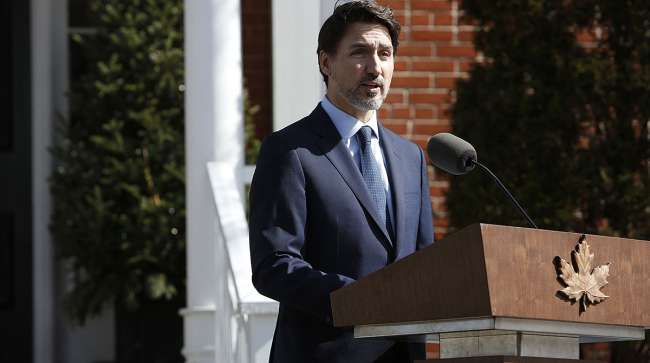Senior Reporter
Canada to Close Border Except for US Citizens, Commerce

[Stay on top of transportation news: Get TTNews in your inbox.]
Canada is closing its borders to anyone who is not a citizen or a permanent resident amid the coronavirus pandemic, Prime Minister Justin Trudeau announced March 16. However, the declaration does not affect the shipment of goods into the country, and for now, U.S. citizens.
Trudeau made the announcement in Ottawa outside his residence, where he has been self-isolating after his wife, Sophie Gregoire, recently tested positive and is being treated by doctors.
“We can still slow the spread of this virus,” Trudeau said at a press conference. “It is time to take every precaution to keep people safe. As the virus continues its spread, we’ve decided to take increasingly aggressive steps to keep you and your family safe.”
THE CRISIS IN PHOTOS: Impact of the spread of the coronavirus
Asked why U.S. citizens still are allowed into Canada, Trudeau said, “We recognize that the level of integration of our two economies and the coordination that we’ve had over the past puts the U.S. in a separate category from the rest of the world,” he said.
The travel restrictions come as Canada has 320 confirmed cases of the illness and four deaths.
The Canadian Trucking Alliance is commending the federal government’s declaration that commercial truck drivers are essential workers who will be exempt from the requirement to self-isolate for at least 14 days upon entering Canada from abroad.
Speaking at a news conference, Transport Minister Marc Garneau said certain kinds of workers — such as truck drivers, train and air crews and others whose professions require cross-border travel to the U.S. to maintain trade and deliver essential products to Canadians — will be exempted from the condition to self-isolate as the government attempts to limit the spread of the coronavirus.
Minister for Public Safety Bill Blair explained why Canada is exempting essential transportation workers, such as truck drivers, from the border restrictions.
“We believe the risk of essential workers crossing the border can be managed effectively,” he said. “For the purposes of not just their own employment but also to keep Canada moving, essential workers need to be able to keep moving across the border.”
Blair and Garneau said if any traveler exhibits symptoms of coronavirus, whether he or she is exempt, that person will be referred to local public health officials and directed to self-quarantine.
Stephen Laskowski, president of the Canadian Trucking Alliance, says the industry is supporting the government’s efforts, and he applauds the government’s recognition of trucking for the role it has in getting food to stores and essential medical supplies to hospitals and clinics.
Feds Recognize Truck Drivers as Critical in Fight Against COVID-19https://t.co/I7zYJYedil pic.twitter.com/bR6RLsikRY — OTA (@OnTruck) March 16, 2020
“Each and every time they’ve been needed, Canada’s truck drivers have always answered the call in an emergency,” Laskowski said in a statement. “These are unprecedented times for Canadians. I have no doubt that, as front-line essential workers, our nation’s truck drivers will do what is required to keep Canada moving and keep Canadians safe.”
Meanwhile, for truck drivers entering from the U.S., CTA says it has spoken with U.S. Customs and Border Protection officials, and now it is “business as usual” unless a U.S.-bound driver has returned from a “hot spot” country within the past 14 days.
“If a truck driver returning from one of the countries listed in President [Donald] Trump’s recent executive order, attempts to cross a border within 14 days, they will be denied entry into the U.S.,” CTA said in a statement. “Officials on both sides of the border have indicated that additional scrutiny and questioning of drivers will occur, but they will attempt to prioritize the efficient movement of truck drivers and goods as much as possible moving forward.”
Also, CTA is working with border-crossing officials on creating a best practices document on how to safely interact and communicate at the border to ensure both drivers and border officers remain safe.
The association also is distributing a separate document helping the industry manage the interaction among carriers and drivers, shippers and other supply chain workers.
Want more news? Listen to today's daily briefing:




